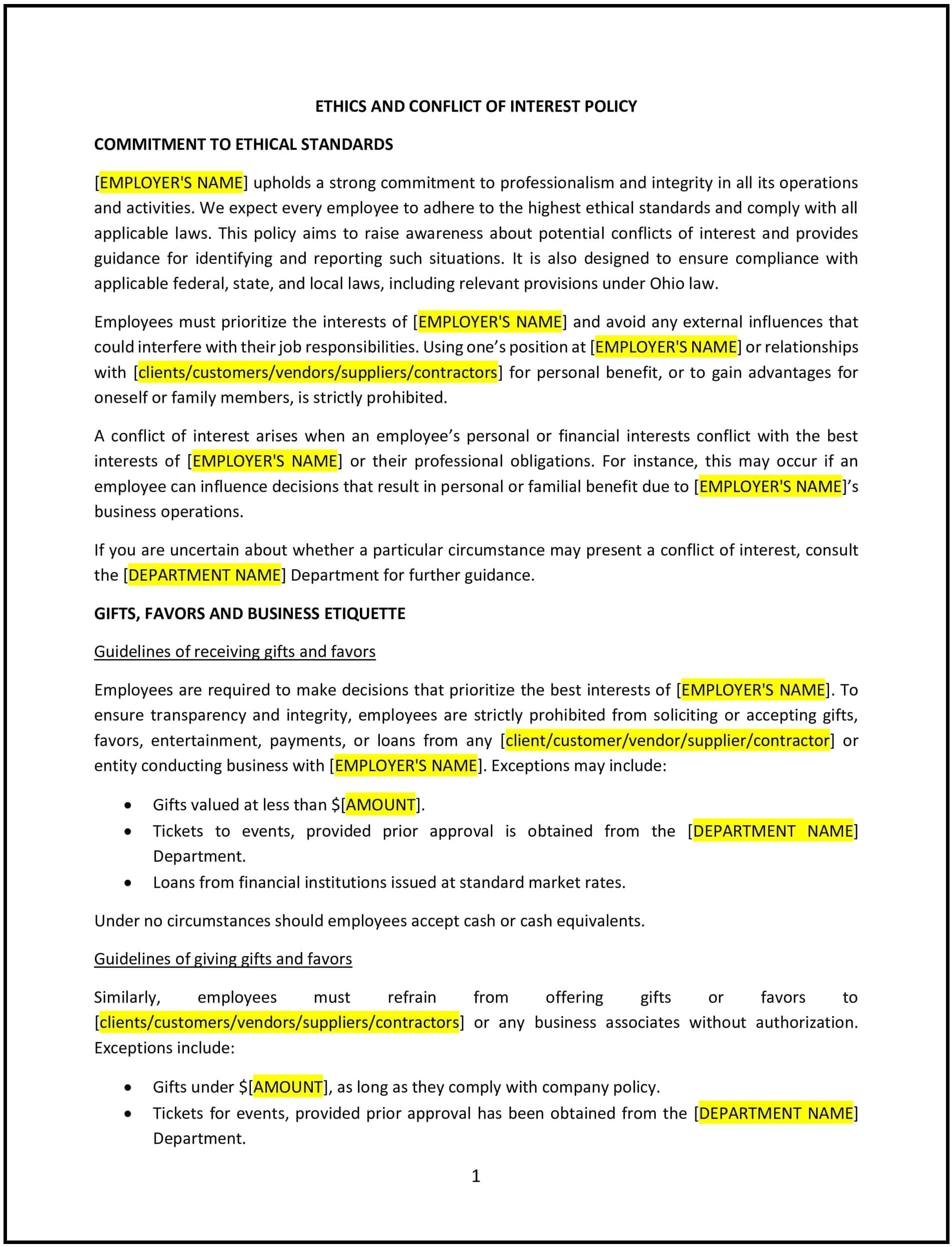Ethics and conflict of interest policy (Ohio): Free template
Got contracts to review? While you're here for policies, let Cobrief make contract review effortless—start your free review now.

Customize this template for free
Ethics and conflict of interest policy (Ohio)
An ethics and conflict of interest policy provides Ohio businesses with guidelines to ensure that employees and other representatives act in the best interests of the business, avoiding situations where personal interests conflict with professional duties. This policy outlines expectations regarding ethical behavior, including honesty, integrity, and transparency, and sets clear rules for disclosing potential conflicts of interest. It also covers gifts, outside employment, and other scenarios that could create conflicts between an employee’s duties to the business and personal or financial interests.
By implementing this policy, Ohio businesses can foster a culture of ethical behavior, reduce the risk of unethical practices, and protect the business from legal and reputational harm.
How to use this ethics and conflict of interest policy (Ohio)
- Define conflicts of interest: The policy should clearly define what constitutes a conflict of interest, including financial interests, relationships with competitors, family connections, or outside business activities that could influence an employee’s actions.
- Establish disclosure requirements: The policy should outline the process by which employees must disclose any potential or actual conflicts of interest. This could include regular disclosure statements, reporting to supervisors, or submitting a formal written statement.
- Set guidelines for handling conflicts of interest: The policy should explain the steps that will be taken when a conflict of interest is disclosed. This could include removing the employee from certain decision-making processes, reassigning tasks, or taking other actions to mitigate the conflict.
- Address acceptance of gifts: The policy should specify the rules for accepting gifts or favors from vendors, clients, or other stakeholders. It should outline acceptable gift limits and circumstances under which gifts should be declined or reported.
- Prevent outside business activities: The policy should define restrictions on outside employment or business activities that may present a conflict of interest. It should specify whether employees can hold outside positions or start businesses that compete with or affect the business.
- Provide ethical guidance: The policy should include a general code of conduct that sets the standard for ethical behavior in all aspects of business, including honesty, transparency, and compliance with laws.
- Clarify enforcement and consequences: The policy should define the consequences of violating the ethics and conflict of interest guidelines, including disciplinary actions such as warnings, suspension, or termination.
- Ensure compliance with Ohio state and federal laws: The policy should ensure that the business’s conflict of interest policies align with Ohio state laws and federal regulations related to ethical conduct in business, such as those related to bribery or financial transparency.
- Review and update regularly: The policy should be reviewed periodically to reflect changes in Ohio state laws, federal regulations, or business operations. It should be updated to address emerging risks and evolving business needs.
Benefits of using this ethics and conflict of interest policy (Ohio)
This policy provides several key benefits for Ohio businesses:
- Promotes ethical conduct: By establishing clear guidelines, the policy helps employees understand the standards for ethical behavior and decision-making, reducing the risk of unethical practices in the workplace.
- Protects business integrity: The policy helps prevent situations where personal interests could harm the business’s reputation, financial standing, or relationships with clients, suppliers, and partners.
- Reduces legal risks: By addressing potential conflicts of interest proactively, businesses reduce the risk of violating laws or regulations related to bribery, corruption, or unfair business practices.
- Enhances transparency: The policy encourages transparency in business dealings by requiring employees to disclose potential conflicts, ensuring that decisions are made in the best interests of the business.
- Fosters a trustworthy workplace culture: A strong ethics policy helps create a workplace culture where employees are encouraged to act with integrity, fostering trust between employees, management, and stakeholders.
- Increases employee accountability: By clearly outlining the rules for ethical behavior, businesses set a high standard for employee conduct, encouraging accountability at all levels of the organization.
- Supports business continuity: Ethical conduct is essential for maintaining positive relationships with clients, vendors, and employees. The policy helps protect the business from reputational damage or loss of business due to conflicts of interest.
Tips for using this ethics and conflict of interest policy (Ohio)
- Communicate the policy clearly: Ensure that the ethics and conflict of interest policy is clearly communicated to all employees by including it in the employee handbook, reviewing it during onboarding, and providing regular training sessions.
- Foster an open culture: Encourage employees to report any potential conflicts of interest without fear of retaliation. The policy should make it clear that the business values transparency and honesty in all matters.
- Monitor compliance: Regularly review and monitor employees’ compliance with the policy, particularly regarding disclosure of conflicts of interest and acceptance of gifts or outside business activities.
- Be consistent with enforcement: Ensure that the policy is enforced consistently across all employees, regardless of their position or seniority. Any violations should be addressed promptly and fairly.
- Provide regular training: Offer ongoing training to employees and managers on ethical decision-making and conflict of interest issues. This helps reinforce the importance of the policy and ensures that employees understand their responsibilities.
- Review the policy periodically: Regularly review and update the policy to ensure it remains aligned with Ohio state laws, federal regulations, and any changes in business practices or operations.